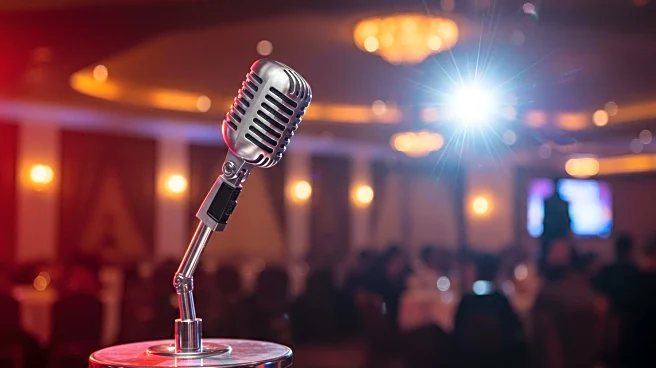What's Happening?
A Justin Bieber impersonator, identified as Dylan Desclos, successfully deceived the staff and patrons at XS Nightclub in the Wynn Las Vegas resort. Desclos, who has been impersonating Bieber for several years, managed to gain access to the stage during a performance by DJ Gryffin. The impersonator's team executed a complex ruse, claiming to be part of Bieber's new management team, which led to Desclos being mistaken for the real pop star. The deception reached its peak when Gryffin announced Bieber's presence, causing excitement among the crowd. However, once the error was discovered, Desclos was removed from the venue and banned permanently. The impersonator's team reportedly incurred a bill close to $10,000 during their visit, which Desclos paid before being escorted out.
Why It's Important?
This incident highlights the challenges faced by entertainment venues in verifying the identity of performers and guests, especially when dealing with high-profile impersonators. The ability of Desclos to deceive a major Las Vegas nightclub underscores the potential for security breaches and financial losses in the hospitality industry. It also raises questions about the effectiveness of current verification processes and the need for more stringent measures to prevent similar occurrences. The event serves as a reminder of the importance of maintaining robust security protocols to protect both the venue's reputation and its financial interests.
What's Next?
Following this incident, it is likely that the Wynn Las Vegas resort and other similar venues will review and potentially tighten their security and verification procedures to prevent future impersonation attempts. The nightclub may implement additional checks for performers and their entourages to ensure authenticity. This could involve closer collaboration with artist management teams and the use of advanced identification technologies. The incident may also prompt discussions within the entertainment industry about the responsibilities of impersonators and the ethical implications of their actions.
Beyond the Headlines
The impersonation incident raises broader ethical questions about the role and impact of celebrity lookalikes in the entertainment industry. While impersonators can provide entertainment value, their actions can also lead to confusion and potential harm to the reputations of the celebrities they mimic. This event may spark conversations about the boundaries of impersonation and the need for clear guidelines to prevent deceptive practices. Additionally, it highlights the cultural fascination with celebrity identities and the lengths to which individuals will go to emulate them.









